Tubular Bells II
Release Date: August 31, 1992
Location: Los Angeles, Roughwood Croft
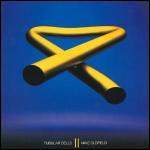
1. Sentinel 8:06
2. Dark Star 2:16
3. Clear Light 5:47
4. Blue Saloon 2:58
5. Sunjammer 2:32
6. Red Dawn 1:49
7. The Bell 6:55
8. Weightless 5:43
9. The Great Plain 4:46
10. Sunset Door 2:23
11. Tattoo 4:14
12. Altered State 5:12
13. Maya Gold 4:00
14. Moonshine 2:20
|
Written by: Mike Oldfield
Produced by: Trevor Horn, Mike Oldfield and Tom Newman
Mike Oldfield plays: Electric guitar, Classical guitar, Flamenco guitar, 12 String guitar, Acoustic guitars, Mandolin, Banjo, Double speed guitar, Grand piano, Hammond organ, Synthesizers and programming, Timpani, Glockenspiel, Triangle, Tambourine, Cymbals, Toy percussion, Handclaps, Orchestral Bass Drum... Plus, Tubular Bells.
Engineered by: Steve MacMillan, Tom Newman, Tim Weidner and Mike Oldfield.
Mixed by: Steve MacMillan and Mike Oldfield.
Technical: Richard Barrie.
Additional Programming and Digital Sound Processing: Eric Cadieux.
Additional Keyboards, Noises and Drum Loops: Jamie Muhoberac.
Drums on "Altered Sate": John Robinson.
Vocals: Susannah Melvoin, Edie Lehman and Mike Oldfield.
Vocal Solo: Sally Bradshaw.
Bagpipes: P.D. Scots Pipe Band and Celtic Bevy Band.
Master of Ceremonies: A Strolling Player.
PA to Mike Oldfield: Jeremy Parker
A Trevor Key photograph.
Cover by Bill Smith Studio. |
Notes
Mike first had thoughts of recording Tubular Bells II after recording a shortened version of Tubular Bells Part One for BBC Radio 1's Nicky Campbell show in 1989. Virgin had wanted to give the title 'Tubular Bells II' to Amarok, but Mike had refused, and it was only as he came to the end of his contact with Virgin that he began work on the idea of a Tubular Bells sequel.
He set up a studio in a hired house in Los Angeles to begin working on the album. Technical engineer Richard Barrie was well prepared for the move, having ensured that all of Mike's studio equipment was connected with multicore cables for ease of disconnecting and reconnecting: "When we took the studio out to Los Angeles, to Beverley Hills for Tubular Bells II, it took me less than a day, from the container turning up, to actually running the studio, and it was just a case of sitting there - you just kind of sit there, you look in the room and you think ‘well, the desk is going to go there, the monitors are there, the tape deck’s there...’ and then you just kind of clip everything together."
Though, in his autobiography, Changeling, Mike refers to this as a portable studio, it was fully featured, and with much of the same equipment as his studio at Roughwood Croft.
The track Early Stages, released as a B-Side to the Sentinel single, is a demo produced by Mike and Tom Newman before recording in LA began, and gives an insight into the direction it was first envisaged the album might go in, with a darker mood more similar to the original Tubular Bells. The arrival of Trevor Horn as co-producer saw the album veer in a distinctly different direction, with a more slick, highly polished sound.
Personnel
| ▸ | Trevor Horn (producer) | |
| | ▸ | Tom Newman (producer) | | Also appears in: Tubular Bells, Hergest Ridge, Platinum, Five Miles Out, Islands, Amarok, Heaven's Open, The Songs of Distant Earth, Voyager
| | ▸ | Steve MacMillan (engineer) | | Also appears in: The Songs of Distant Earth, Man on the Rocks
| | ▸ | Tim Weidner (engineer) | |
| | ▸ | Richard Barrie (technical engineer) | | Also appears in: QE2, Five Miles Out, Islands, Earth Moving, Amarok, Heaven's Open, The Songs of Distant Earth, Voyager
| | ▸ | Celtic Bevy Band (ensemble) | |
| | ▸ | P.D. Scots Pipe Band (ensemble) | | Actually pipers from the Los Angeles police department. Mike wanted to play down the connection with the LA police, after the riots following the trial of Rodney King. Mike said at the time that, although the pipers themselves were musicians and not 'professional sadistic people', he didn't want their appearance on the album to seem like an act of sympathy towards LAPD, who Mike realised were not too popular at the time.
| | ▸ | Sally Bradshaw (musician) | | English soprano, specialising in opera from before 1800, with a great love of Handel, whose operas she has performed in worldwide. Recently worked with "The art of noise"
|
| | ▸ | Edie Lehman (musician) | | Has worked as a vocalist with Aretha Franklin and Belinda Carlisle, amongst others.
| | ▸ | Susannah Melvoin (musician) | | Singer who has worked with the likes of Eric Clapton, Neil Finn, Roger Waters and Prince. Susannah also writes songs, and co-wrote 'Candy perfume girl' on Madonna's 'Ray of light' album.
| | ▸ | Jamie Muhoberac (musician) | |
| | ▸ | Alan Rickman (musician) | | Credited as 'A strolling player'
| | ▸ | John Robinson (musician) | | Session drummer who's played with an absolutely huge number of well known artists. Amongst those are Michael Jackson, George Benson, Elton John, Eric Clapton and Steve Winwood. Also appears in: Man on the Rocks
| | ▸ | Eric Caudieux (synth programmer) | | Worked with Trevor Horn in 1991 on Marc Almond's album 'Jacky'. It would seem that Horn drafted in Eric Caudieux to work on Tubular Bells II. Has also worked with Joe Satriani, on his album 'Engines of Creation'. Caudieux is credited for digital sound processing, with the digital sound processor getting a namecheck in 'The Bell'. Of course, a digital sound processor can be anything that processes sound digitally...in addition, most processors don't make sounds of their own. What Mike seems to use is a little synthesiser arpeggio which represents the digital sound processor instead. Also appears in: The Songs of Distant Earth
| | ▸ | Bill Smith (cover artwork) | | Also appears in: Voyager, Tubular Bells III, Guitars, Tres Lunas
|
|
Instruments
| Miscellaneous stringed instruments |
| Gibson RB-250 Mastertone Banjo |
Mike appeared with this banjo at the Tubular Bells II premiere concert in Edinburgh. Its appearance is consistent with a post-1960s RB-250, so our current best guess is that it's the same banjo which Mike used on every album from Ommadawn onwards.

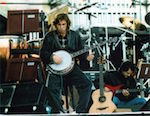 |
Also used in Ommadawn, Crises, Amarok
|
| Percussion instruments |
| Tubular Bells |
The 'toy' set bought for the making of Tubular Bells II. |
Also used in Tubular Bells 2003
|
| Electric guitars |
| 1963 Fender Stratocaster, fiesta red |
s/n L08044. Mike once said in an interview (The Raft) that this was his favourite guitar and that he'd never sell it. However, he finally decided to part company with it in December 2007 and sold it through Chandler guitars, fetching £30,000.
         
 |
Also used in Discovery, Amarok, The Songs of Distant Earth, Voyager, Tubular Bells III, Guitars, Tubular Bells 2003, Light + Shade
|
| 1959 Fender Stratocaster, sunburst |
This was the first of the Strats that Mike bought. The scratchplate of this guitar was modified, probably in the 1990s, to make space for a Roland GK-2 synth pickup.
  
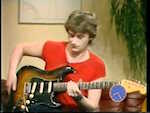 |
Used for playing guitar synth parts
Also used in Crises, Discovery, Guitars
|
| Gibson ES335 |
Mike bought this in LA. He later replaced it with a PRS Hollowbody, which he said he preferred. It later appeared in a tweet by Caroline Monk and may now be owned by her.
      
 |
A number of pictures of Mike in his Los Angeles studio show Mike with this guitar, suggesting he may have been using it to record Tubular Bells II. |
| 1989 PRS Signature, Vintage Yellow |
A particularly high grade, limited edition, version of the Custom 24. In Vintage Yellow.
           
 |
Also used in Earth Moving, Amarok, The Songs of Distant Earth, Voyager, Tubular Bells III, Guitars, Tubular Bells 2003, Light + Shade, Return To Ommadawn
|
| Nylon-string guitars |
| 1975 Jose Ramirez 1A Flamenco |
s/n 8666. Sold through Chandler to a French Fan and later resold to a German fan.
            
 |
Also used in Ommadawn, QE2, Amarok, Guitars, Tubular Bells 2003
|
| Bass guitars |
| PRS Bass 4, Vintage Yellow |
  
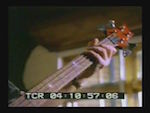 |
Seen in the 'Making of TB2' video clips, so presumably used on the album as well.
Also used in Amarok
|
| 1991 Wal Custom bass |
s/n W3557. Sold to a German fan via Chandler Guitars in February 2006.
    
 |
Also used in Tubular Bells III, Guitars, Tubular Bells 2003
|
| Guitar effects |
| Roland GP-8 |
Guitar effects processor used for Mike's trademark 90s distorted guitar sound. Sold via ebay in December 2007. |
Also used in Amarok, The Songs of Distant Earth, Tubular Bells 2003, Return To Ommadawn
|
| Organs |
| Farfisa Professional Organ |
Return To Ommadawn used a Farfisa sotware emulation.

 |
Also used in Tubular Bells, Hergest Ridge, Ommadawn, Incantations, Crises, Amarok, Tubular Bells 2003, Return To Ommadawn
|
| 1970 Hammond L.122 Organ |
Return To Ommadawn used an Hammond software simulation. |
Also used in Amarok, Heaven's Open, Tubular Bells 2003, Return To Ommadawn
|
| Lowrey Organ |
|
Also used in Tubular Bells, Hergest Ridge, Amarok, Tubular Bells 2003
|
| Synthesisers |
| E-Mu Proteus |
Digital sample playback sound module. |
Also used in Heaven's Open, The Songs of Distant Earth
|
| Ensoniq SD-1 |
|
Also used in The Songs of Distant Earth
|
| Korg M1 |
The biggest selling digital keyboard of all time, the Korg M1 was used by many artists after its release in 1988. |
Also used in Earth Moving, Heaven's Open, The Songs of Distant Earth
|
| New England Digital Synclavier |

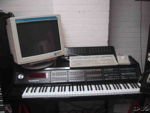 |
Mentioned in Keyboards, October 1992. |
| Roland D-550 |
Linear Algorhythmic Synthesis module. |
Also used in Heaven's Open, The Songs of Distant Earth
|
| Roland D-50 |
Linear Algorhythmic synthesiser keyboard. |
Also used in Islands, Earth Moving, Amarok, Heaven's Open, The Songs of Distant Earth
|
| Samplers |
| Akai S-1100 |
Mike owned both an 8MB and a 32MB version. |
Also used in Heaven's Open, The Songs of Distant Earth
|
| Loudspeakers |
| Coastal Acoustics Boxer T4 |
|
Also used in The Songs of Distant Earth, Voyager, Tubular Bells III, Guitars, The Millennium Bell, Tres Lunas, Tubular Bells 2003
|
| Meyer HD-1 |
Nearfield monitors. |
These appear to have been Mike's main nearfield speakers.
Also used in The Songs of Distant Earth, Voyager, Tres Lunas
|
| Tannoy SRM10B |
10" Super Red Monitors. Used as nearfield monitors, as part of Mike's Islands-era video setup. Also used in Mike's Los Angeles studio while recording Tubular Bells II. |
Kept on a bookshelf at the back of Mike's Los Angeles studio, so probably not used for the bulk of editing and mixing work, but possibly used as a secondary (or tertiary) reference set.
Also used in Islands
|
| Studio effects and outboard |
| Urei 1178 dual channel peak limiter |
|
Also used in Crises, Tubular Bells 2003
|
| Urei 1176 Peak Limiter |
Mike originally borrowed some of these from the Manor Mobile, but later acquired his own. |
Can be spotted in pictures of Mike's equipment rack in LA.
Also used in Ommadawn, Incantations, Platinum, Tubular Bells 2003
|
| Tape recorders |
| Sony PCM-3348 |
48 track digital multitrack tape recorder, recording to Ampex 467 1/2" oxide tape.

 |
Also used in Amarok, Heaven's Open, The Songs of Distant Earth, Voyager, Tubular Bells III
|
| Mixing desks |
| Harrison Series X |
The world's first fully automated mixing desk. Where desks like Mike's Neve 8108 often had little more than automation/recall of channel levels and mutes, the Harrison was able to automate other parameters like panning and aux sends, making it far easier to recall a mix. It was released in 1985, and Mike claimed that his was the first in England.

 |
Also used in Islands, Earth Moving, Amarok, Heaven's Open
|
| Computers |
| Atari STacy portable computer |
Used as part of Mike's late 80s portable sequencing setup, together with the walkman with powered speakers and two Roland MT32 sound modules. |
Also used in Earth Moving, Heaven's Open
|
| Sequencers |
| C-Lab Notator |
Sequencing software for the Atari ST |
Also used in Earth Moving, Heaven's Open
|
| Computer software |
| C-Lab Notator |
Sequencing software for the Atari ST |
Also used in Earth Moving, Heaven's Open
|
|
|

